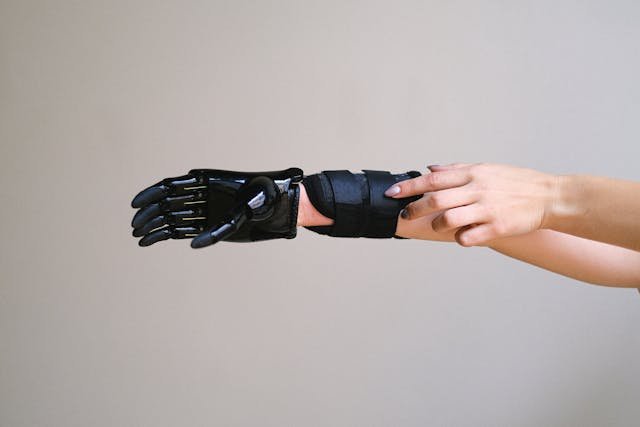Choosing the right prosthetic hand after a trans-radial (below-the-elbow) amputation is a crucial decision. A well-fitted and functional prosthetic can restore independence, improve mobility, and enhance confidence. However, with various options available, selecting the best one requires careful consideration of factors like control type, functionality, comfort, and lifestyle needs.
Each person’s requirements are unique—some may need a prosthetic for daily tasks, while others might seek advanced myoelectric hands for precision movements. Understanding how different prosthetic hands work and what features they offer will help you make an informed choice. In this article, we will explore everything you need to know about selecting the best prosthetic hand for trans-radial amputation.
Understanding Trans-Radial Prosthetics
A trans-radial amputation occurs below the elbow, leaving the elbow joint intact. This means that while natural hand and wrist functions are lost, the remaining forearm allows for significant movement and control over a prosthetic.
Why Choosing the Right Prosthetic Hand Matters
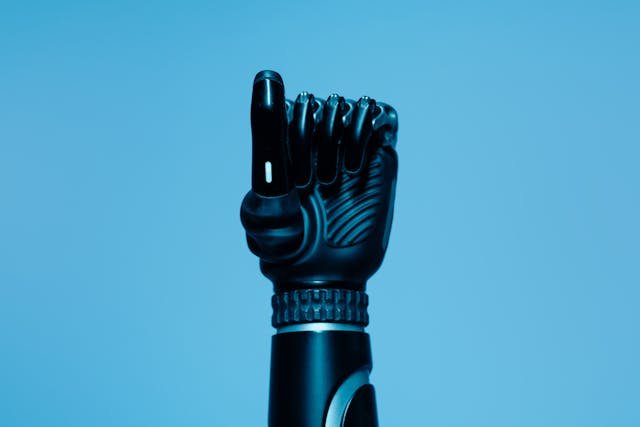
A prosthetic hand does more than just replace a lost limb—it affects mobility, comfort, and overall quality of life. The right prosthetic should fit well, provide necessary functionality, and align with your lifestyle. Some users may need a basic prosthetic for simple gripping, while others require a multi-functional device for complex tasks.
A poorly chosen prosthetic can lead to discomfort, difficulty in performing daily activities, and even physical strain on the remaining limb. That’s why it’s essential to evaluate different options and work closely with a prosthetist to find the best solution.
How Trans-Radial Prosthetics Work
Most trans-radial prosthetic hands attach to the forearm through a custom-fitted socket. Depending on the type of prosthetic, movement is controlled through body-powered cables, electrical signals from muscles, or a combination of both. Some models offer wrist rotation and multiple grip patterns, helping users perform a wider range of activities.
Understanding these control mechanisms and their advantages will help you determine which type of prosthetic hand suits your needs best.
Types of Prosthetic Hands for Trans-Radial Amputation
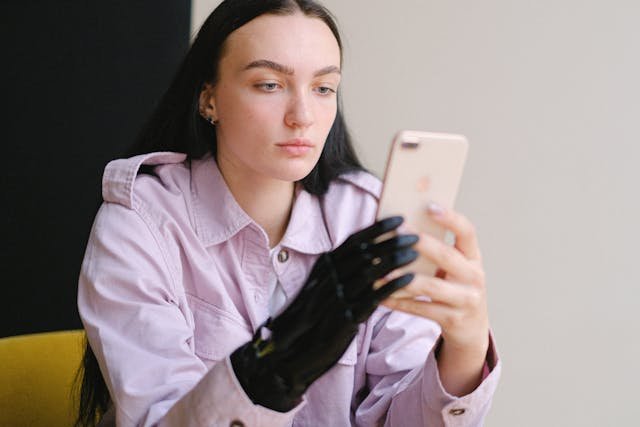
Different types of prosthetic hands are available, each with unique features and control methods. The choice depends on your functional needs, activity level, and budget.
Body-Powered Prosthetic Hands
Body-powered prosthetics use a system of cables and harnesses that are controlled by movements from the user’s upper body. When the user moves their shoulder or upper arm, the cables pull the prosthetic fingers or hook into action.
This type of prosthetic is highly durable and does not require batteries or external power. It provides good proprioceptive feedback, meaning users can feel resistance when gripping objects. Because of its mechanical nature, it is also more affordable than electronic options.
However, body-powered hands require physical effort to operate, which can be tiring for some users. They also have a limited range of grip options compared to myoelectric prosthetics. Despite this, they are an excellent choice for individuals looking for a low-maintenance and reliable prosthetic solution.
Myoelectric Prosthetic Hands
Myoelectric prosthetic hands use electrical signals from the user’s muscles to control movement. Sensors placed inside the socket detect these signals and translate them into hand and finger motions, allowing for a more natural and intuitive control system.
The biggest advantage of myoelectric hands is their ability to perform multiple grip patterns, such as pinching, grasping, and rotating. This makes them ideal for tasks requiring fine motor control, such as typing, holding delicate objects, or using tools.
While myoelectric prosthetics offer advanced functionality, they require regular charging and maintenance. They are also more expensive than body-powered options. Additionally, users must undergo training to learn how to effectively control their prosthetic hand using muscle signals.
Hybrid Prosthetic Hands
Hybrid prosthetic hands combine body-powered and myoelectric technologies, offering both mechanical reliability and advanced electronic control. Users can switch between different control modes depending on the task, making them a flexible option for those who need both strength and precision.
Hybrid systems are particularly useful for individuals who perform a variety of tasks throughout the day. They provide the durability of body-powered prosthetics with the versatility of myoelectric control. However, they tend to be more complex in design and require regular adjustments to maintain efficiency.
Key Factors to Consider When Choosing a Prosthetic Hand

The best prosthetic hand for a trans-radial amputation depends on several factors, including comfort, function, and lifestyle compatibility.
Functionality and Daily Activities
Your daily routine plays a major role in determining the right prosthetic hand. If you engage in manual labor or sports, a durable body-powered or hybrid prosthetic may be the best choice. If you need fine motor skills for office work or creative tasks, a myoelectric hand with multiple grip functions would be more beneficial.
Some prosthetic hands come with interchangeable grip modes, allowing users to switch between power grips, precision pinches, and lateral grasps. These features are especially useful for individuals who require versatility in their daily activities.
Comfort and Fit
A well-fitted prosthetic is crucial for long-term use. The socket—the part of the prosthetic that connects to the residual limb—should be customized to provide a snug and secure fit without causing discomfort. Poorly fitted sockets can lead to skin irritation, pressure sores, and difficulty in controlling the prosthetic.
Modern prosthetic sockets are designed with lightweight materials and breathable liners to improve comfort. Vacuum suspension and silicone-based liners help create a secure attachment, reducing strain on the residual limb.
Weight and Durability
The weight of a prosthetic hand affects usability and fatigue. Heavier prosthetics may provide better durability and strength, but they can also cause strain over time. On the other hand, lightweight prosthetics are easier to wear but may not be as strong.
Carbon fiber and titanium are commonly used materials for prosthetic components, offering a balance between strength and weight. Choosing the right material ensures that the prosthetic remains functional without being too heavy for daily use.
Training and Rehabilitation for Prosthetic Hand Users
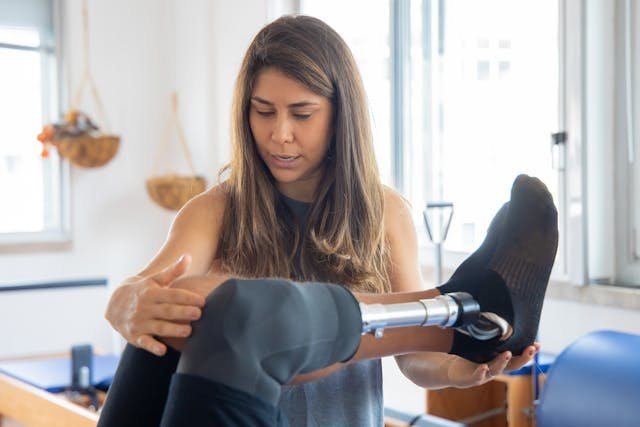
Getting a prosthetic hand is just the first step—learning how to use it effectively requires training and rehabilitation.
Building Muscle Strength for Control
For body-powered and myoelectric prosthetics, strengthening the remaining forearm muscles is essential. Physical therapy exercises help users develop better control over grip strength and movement precision.
Myoelectric users, in particular, must learn how to generate consistent muscle signals to operate their prosthetic hand effectively. This training process ensures smoother and more natural movements.
Learning Everyday Skills with a Prosthetic Hand
Daily tasks like holding utensils, tying shoelaces, or using a smartphone can feel challenging at first. Occupational therapists help users practice these skills, teaching them adaptive techniques to improve efficiency.
Advanced myoelectric hands often come with training programs to help users familiarize themselves with different grip patterns. Practicing with these modes allows for quicker adaptation and improved confidence in using the prosthetic.
Ongoing Maintenance and Adjustments
Regular maintenance is necessary to keep a prosthetic hand functioning properly. Users should check for signs of wear, ensure proper socket fit, and follow cleaning guidelines to maintain hygiene.
Prosthetists also provide periodic adjustments to improve comfort and usability. As the residual limb changes shape over time, socket modifications may be needed to maintain a proper fit.
The Role of Technology in Enhancing Prosthetic Hand Performance

Modern advancements in prosthetic technology are reshaping the way individuals with trans-radial amputations experience and use their prosthetic hands. Innovations in artificial intelligence, robotics, and material science are making prosthetic hands more functional, intuitive, and user-friendly than ever before.
AI-Driven Prosthetic Hands: Learning from User Movements
Artificial intelligence (AI) is revolutionizing the way myoelectric prosthetic hands function. Traditional myoelectric hands rely on pre-set muscle signals to trigger specific movements, but AI-powered hands take this a step further.
With machine learning algorithms, prosthetic hands can analyze a user’s movement patterns over time. This allows the prosthetic to “learn” and adapt to the user’s natural gestures, making movements smoother and more precise. Over time, the prosthetic becomes more intuitive, reducing the learning curve and making daily tasks easier.
For example, AI-powered prosthetics can predict which grip a user needs based on previous interactions. If a user frequently switches between a power grip for lifting objects and a precision grip for picking up small items, the prosthetic can anticipate and adjust accordingly. This level of adaptability enhances user experience and improves efficiency.
Bionic Feedback: Restoring the Sense of Touch
One of the biggest challenges for prosthetic users is the lack of sensory feedback. Without feeling pressure, temperature, or texture, prosthetic users must rely entirely on visual and muscle cues to control their grip strength.
However, new developments in bionic technology are introducing sensory feedback into prosthetic hands. Electrodes placed within the prosthetic socket can detect pressure on the artificial fingers and send electrical signals to the user’s nervous system. This allows the brain to interpret sensations, enabling users to “feel” what they are touching.
Although this technology is still in its early stages, researchers have successfully created prosthetic hands that provide limited touch feedback. As these innovations progress, users may soon experience prosthetics that restore a more natural sense of interaction with their environment.
3D-Printed Prosthetic Hands: Affordable and Customizable Solutions
One of the most exciting developments in prosthetic technology is the use of 3D printing to create custom-designed hands. Traditional prosthetic manufacturing is costly and time-consuming, but 3D printing allows for faster production and greater affordability.
With 3D-printed prosthetic hands, users can benefit from:
- Customization: Prosthetic hands can be tailored to fit the exact shape and size of the user’s residual limb, ensuring a better fit and improved comfort.
- Affordability: Compared to traditional prosthetics, 3D-printed options are significantly more cost-effective, making them accessible to a larger number of users.
- Lightweight Design: 3D-printed materials are often lighter than traditional metal components, reducing strain on the residual limb.
At Robobionics, we continuously explore emerging technologies to provide prosthetic solutions that are both high-quality and cost-effective. As 3D printing technology continues to evolve, it will open up even more possibilities for personalized and affordable prosthetic hands.
Financing and Accessibility: Making Prosthetic Hands More Attainable
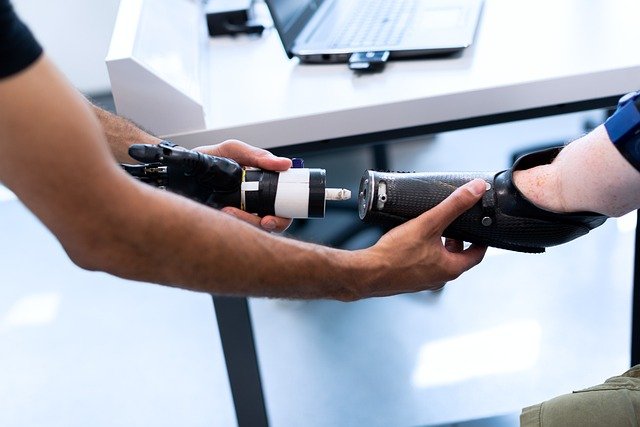
While prosthetic technology has advanced significantly, affordability and accessibility remain major concerns for many individuals seeking a high-quality prosthetic hand. The cost of prosthetic hands varies widely based on technology, materials, and customization. For trans-radial amputees, understanding financial options and available resources can help make prosthetic solutions more attainable.
Understanding the Cost of Prosthetic Hands
The price of a prosthetic hand depends on several factors, including its complexity, functionality, and materials.
- Body-powered prosthetic hands are generally the most affordable option. These mechanical devices use cables and harnesses to function and do not require batteries or electronics. While cost-effective, they may have limited functionality compared to high-tech models.
- Myoelectric prosthetic hands are more expensive due to their advanced control systems. They require sensors, battery power, and microprocessors to operate, allowing for natural movement and multiple grip modes.
- Hybrid prosthetic hands combine both body-powered and myoelectric technology, offering flexibility but also increasing costs due to the integration of different control mechanisms.
Additionally, the socket and suspension system, which custom-fits the prosthetic to the user’s limb, adds to the overall cost. The fit of the socket is crucial for comfort and long-term wearability, making it an important investment.
Insurance and Financial Assistance for Prosthetic Hands
Many individuals worry about how they will afford a prosthetic hand, but financial assistance options are available. In India and other countries, health insurance and government programs may cover part or all of the cost of a prosthetic limb.
- Health Insurance Coverage: Some insurance providers offer partial or full coverage for prosthetic devices. It is important to check with your provider to understand the specific benefits and limitations.
- Government Assistance Programs: In India, various government programs and initiatives aim to provide financial aid for prosthetic users, especially under schemes like the Ayushman Bharat program. Non-profit organizations also work toward offering subsidized prosthetics to those in need.
- Crowdfunding and NGO Support: Many individuals turn to crowdfunding platforms to raise funds for their prosthetic needs. Organizations and charities specializing in disability support can also help with financial assistance and accessibility.
At Robobionics, we work closely with users to explore financial aid options, ensuring that prosthetic solutions are not out of reach due to cost concerns.
Improving Accessibility Through Localized Services
One of the challenges many prosthetic users face is the availability of fitting, maintenance, and repair services. Imported prosthetics often come with long wait times and high servicing costs.
To address this, Robobionics focuses on “Make in India” prosthetic solutions that offer faster, localized service and affordable repairs. By reducing dependence on foreign suppliers, we ensure that users receive timely assistance without excessive costs.
Additionally, we emphasize home-based rehabilitation programs to help users adapt to their prosthetic hands with ease. Training and follow-up support play a crucial role in improving usability, ensuring that individuals get the most out of their device.
Conclusion: Making the Right Choice for Your Prosthetic Hand
Choosing the best prosthetic hand for a trans-radial amputation requires careful consideration of function, comfort, and personal needs. Whether you opt for a body-powered, myoelectric, or hybrid system, the key is finding a prosthetic that fits seamlessly into your lifestyle.
At Robobionics, we are committed to providing high-quality prosthetic solutions that enhance mobility and independence. If you’re exploring your options, contact us today for expert guidance and a personalized consultation. Your journey to confidence and functionality starts here.



